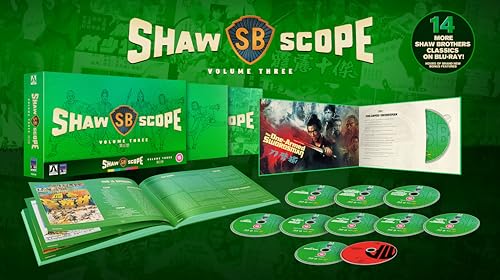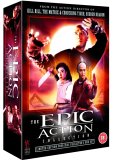 Shawscope Volume Three Limited Edition Blu-ray | Blu Ray | (24/03/2025)
from £134.25
| Saving you £N/A (N/A%)
| RRP
Shawscope Volume Three Limited Edition Blu-ray | Blu Ray | (24/03/2025)
from £134.25
| Saving you £N/A (N/A%)
| RRP Before Hong Kong's mightiest film studio mastered the art of the kung fu film, Shaw Brothers hit box office gold with a very different kind of martial arts cinema, one that channelled the blood-soaked widescreen violence of Japanese samurai epics and Italian spaghetti westerns into a uniquely Chinese form: the wuxia pian. With their enthralling tales drawn from historical myth and legend of sword-wielding (and often gravity-defying) noble heroes, the wuxia films housed in this next instalment of Arrow Video's best-selling Shawscope series demonstrate the sweeping stylistic evolution of the genre, from the righteous stoicism of the late-60s Mandarin period, right through to the wild-and-weird anarchism of the early-80s Cantonese explosion. The iconic One-Armed Swordsman trilogy, directed between 1967 and 1971 by wuxia cinema godfather Chang Cheh, made household names of stars Jimmy Wang Yu and David Chiang and set the gory template for many of the films to come. Contrary to Chang's tales of loyal brotherhood, many wuxia films focused on female protagonists, three very different examples of which we see next: Ho Meng-hua's Lady Hermit, with the great Cheng Pei-pei (Come Drink with Me) as a virtuous swordswoman called upon to stop a vicious warlord; Chor Yuen's scandalous Intimate Confessions of a Chinese Courtesan in which the titular lady of the night masters every deadly skill she can to get revenge on those who enslaved her; and Cheng Kang's all-star epic The 14 Amazons, in which Shaws' finest starlets play the real-life women of the Yang dynasty, avenging their fallen menfolk in battle. Next, Chor Yuen adapted several beloved novels by consummate wuxia storyteller Gu Long to the big screen, four of which are collected here: The Magic Blade, Clans of Intrigue, Jade Tiger and The Sentimental Swordsman, all starring the redoubtable Ti Lung. As kung fu overtook wuxia at the box office, the genre evolved into unexpected new directions, with its chivalrous knights-errant replaced by conflicted antiheroes, as seen in Sun Chung's breathlessly exciting The Avenging Eagle and Boxer's Omen goremeister Kuei Chih-hung's fatalistic masterpiece Killer Constable. Finally, just when it seemed the wuxia film had nowhere left to turn, Eighties excess reigned supreme in the special-effects-soaked, fourth-wall-breaking fantastical delights of Taylor Wong's Buddha's Palm and Lu Chun-ku's Bastard Swordsman. Back with all-new exclusive restorations and hours of insightful bonus material, if you thought the previous two Shawscope sets showed the Shaw Brothers studio at its strongest, you ain't seen nothing yet! LIMITED EDITION BLU-RAY COLLECTION CONTENTS - High Definition (1080p) Blu-ray presentations of all fourteen films, including thirteen new 2K restorations by Arrow Films from the original negatives, and a new 4K restoration of One-Armed Swordsman by Celestial Pictures - Original uncompressed Mandarin mono, plus Cantonese and/or English (where applicable) lossless mono options - Newly translated English subtitles for each film - Illustrated 60-page collectors' booklet featuring new writing by David West, Jonathan Clements and Dylan Cheung, plus cast and crew listings and notes on each film by Ian Jane - New artwork by Tony Stella, Ilan Sheady, Tom Ralston, Jolyon Yates, Kung Fu Bob and Chris Malbon - Hours of illuminating bonus features, including feature commentaries on each film, several cast-and-crew interviews from the Frédéric Ambroisine Video Archive, and the rare alternate Korean cut of Killer Constable - Exclusive CD of music from the De Wolfe Music Library, as heard in The Avenging Eagle and other Shaw Brothers classics
 Iron Monkey / Thai Chi Boxer / Wing Chun | DVD | (26/12/2005)
from £N/A
| Saving you £N/A (N/A%)
| RRP
Iron Monkey / Thai Chi Boxer / Wing Chun | DVD | (26/12/2005)
from £N/A
| Saving you £N/A (N/A%)
| RRP This box set features a collection of titles from the master of modern-day action choreography Yuen Woo-Ping. Iron Monkey - Platinum Edition: One of the most visually spectacular films ever produced by a Hong Kong studio this is a traditional epic style movie boasting fight choreography by Yuen Woo Ping action director of ""The Matrix"" ""Crouching Tiger Hidden Dragon"" and ""Kill Bill vol 1"" and soon-to-be Hollywood star Donnie Yen. This film is credited by fans and critics a
![A Man Called Hero [1999]](/pictures/1003981.jpg) A Man Called Hero | DVD | (21/05/2001)
from £9.55
| Saving you £10.44 (109.32%)
| RRP
A Man Called Hero | DVD | (21/05/2001)
from £9.55
| Saving you £10.44 (109.32%)
| RRP An example of Hong Kong action cinema at its most mainstream, A Man Called Hero owes perhaps more to the films of Steven Segal than it does those of John Woo. The tale of a mythical hero who borders on the status of superhero, the film is stripped of any potential credibility by some of the most appalling dubbing ever seen at the cinema. While the original Chinese cast may inject the movie with passion, their American voice-over replacements obviously never made it past the sincere section of acting class. Each line is delivered with such false earnestness that the film sounds like a cross between Days of Our Lives and an episode of Pokémon. No cinematic cliché is left untouched, suggesting that this is not just a case of something lost in the translation but just a bad film... in anybody's language. The world-wide success of Crouching Tiger, Hidden Dragon has proved that there is a huge market for original Eastern cinema, even more reason to avoid the pointless rehashing of the worst of Hollywood that A Man Called Hero undoubtedly is. --Phil Udell
![They Wait [DVD] [2007]](/pictures/1098726.jpg) They Wait | DVD | (18/01/2010)
from £5.48
| Saving you £0.51 (9.31%)
| RRP
They Wait | DVD | (18/01/2010)
from £5.48
| Saving you £0.51 (9.31%)
| RRP When a family return to Shanghai for a family funeral their son begins to have visions of ghosts and then falls ill. With medical science offering no hope a mysterious pharmacist offers help and the family are in a race against a time to prevent their son being lost forever.

Please wait. Loading...
This site uses cookies.
More details in our privacy policy